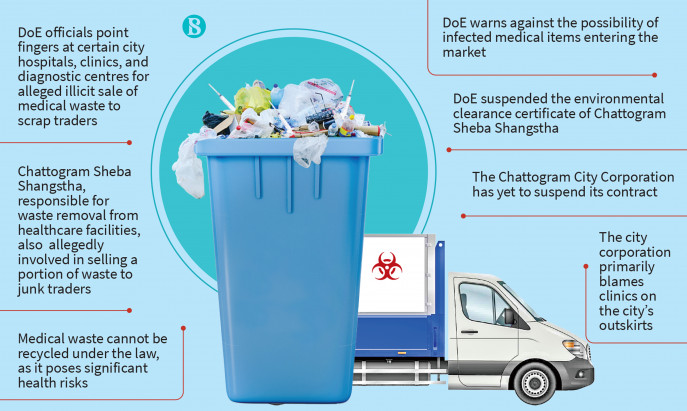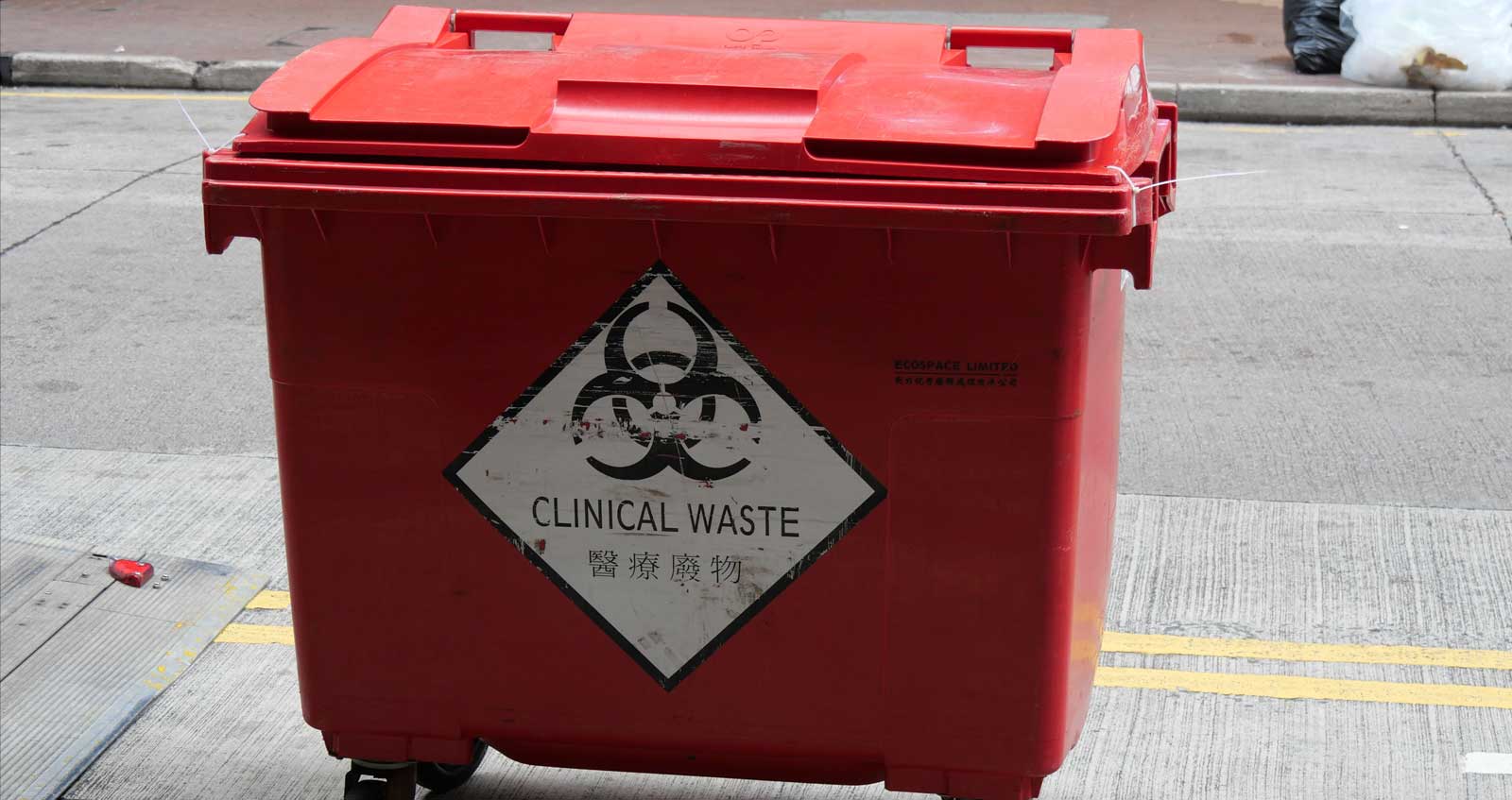Proactive Health Solutions: Choosing the Best Medical Waste Removal Near You
Wiki Article
Remain Ahead of Laws: Professional Guidance on Medical Garbage Disposal
In a globe where the health care market is constantly developing, it is imperative for medical centers to stay ahead of policies when it pertains to the proper disposal of medical waste. With stringent standards and regular regulatory adjustments, it can be testing to browse the complexities of this procedure. Nevertheless, with experienced guidance, centers can ensure compliance and reduce threats associated with inappropriate waste disposal. From understanding the different groups of medical waste to implementing the right collection and partition techniques, this discussion will certainly supply useful insights and workable pointers to aid centers stay ahead of laws in the ever-changing landscape of clinical waste disposal.Understanding Clinical Waste Categories
Recognizing clinical waste classifications is necessary for appropriate disposal and administration in medical care centers. Clinical waste describes any waste produced by healthcare tasks that may pose a hazard to public health and wellness or the setting. It is crucial to categorize medical waste properly to ensure its safe handling, transportation, treatment, and disposal.There are several categories of medical waste that healthcare facilities require to be acquainted with. One of the most common categories include transmittable waste, pathological waste, sharps waste, pharmaceutical waste, and chemical waste. Each group has details standards and policies for its proper administration and disposal.
Contagious waste consists of materials polluted with blood or various other physical fluids, such as gloves, gowns, and lab cultures. Pathological waste refers to human tissues, organs, or body parts that call for special delivery and disposal. Sharps waste includes utilized needles, syringes, and other sharp items that can cause injury and transfer infections. Pharmaceutical waste makes up expired, extra, or contaminated medicines that require mindful handling and disposal. Lastly, chemical waste includes solvents, anti-bacterials, and various other chemical substances made use of in medical care centers.
Staying Up-To-Date With Regulatory Modifications
Staying present with regulative changes is essential for healthcare facilities to guarantee conformity and correct monitoring of clinical garbage disposal. medical waste removal services. With policies regularly progressing, it is crucial for healthcare facilities to stay up-to-date to prevent penalties, fines, and prospective damage to the atmosphere and public healthTo stay ahead of governing adjustments, medical care centers should develop a system for tracking and tracking updates. This can be done by signing up for regulatory e-newsletters, going to workshops and conferences, and proactively taking part in market associations. Additionally, centers must assign a personnel participant or group in charge of remaining notified and sharing info to pertinent stakeholders.
Normal communication with regulatory agencies is additionally vital. Healthcare centers must develop relationships with neighborhood, state, and federal agencies to guarantee they know any type of adjustments in policies that might influence their waste management practices. This can be done via regular meetings, involvement in public remark durations, and proactive interaction with governing agencies.
Furthermore, medical care facilities need to think about partnering with waste management business that specialize in medical garbage disposal (medical waste disposal services with WasteX). These firms are frequently skilled in the most recent regulations and can supply advice and assistance to ensure compliance
Carrying Out Appropriate Collection and Partition Methods
To efficiently handle clinical garbage disposal, medical care centers must establish appropriate collection and segregation approaches based on governing standards. Applying these approaches ensures the secure handling and disposal of possibly unsafe materials, safeguards the environment, and minimizes the risk of infections and injuries to health care employees and the basic public.
Proper collection and segregation methods include making use of assigned containers and labeling systems. Health care facilities ought to offer clearly classified containers for various types of medical waste, such as sharps, infectious waste, pharmaceutical waste, and non-hazardous waste. These containers need to be color-coded and plainly marked to avoid complication and promote easy recognition.
In addition, health care facilities should educate their personnel on the appropriate treatments for gathering and segregating medical waste. This consists of informing them on the different kinds of waste, the proper containers to utilize, and the these details significance of following guidelines and guidelines. Normal training sessions and refresher course programs must be carried out to make sure that team member continue to be updated on finest practices.
Furthermore, healthcare centers should establish a system for normal collection and disposal of clinical waste. This might entail partnering with accredited waste administration companies that specialize in clinical garbage disposal. These companies will certainly guarantee that the collected waste is transported and disposed of in conformity with regulatory demands.
Choosing the Right Disposal Methods
medical waste disposal services with WasteX
Incineration is just one of the most efficient and typical techniques for dealing with specific sorts of medical waste, such as pathological waste and sharps. It includes the controlled combustion of waste at heats, minimizing it to ash. Nonetheless, incineration can launch unsafe toxins right into the air and add to air contamination.

Other disposal approaches include chemical treatment, microwave therapy, and landfilling. Chemical treatment involves using chemicals to counteract the waste and decontaminate. Microwave treatment utilizes microwave power to warm and disinfect the waste. Landfilling includes burying the waste in an assigned land fill area (medical waste disposal services with WasteX). Nonetheless, landfilling needs to be the last resource due to the prospective danger of contamination to dirt and groundwater.
Guaranteeing Conformity Through Documentation and Training
After carefully taking into consideration the appropriate disposal approaches for medical waste, medical care centers should make certain compliance with laws and minimize ecological influence by applying reliable documents and training treatments. This step is important in preserving a safe and sustainable atmosphere for both health care workers and the general public.
Training is similarly essential in ensuring compliance with guidelines. Medical care employees who deal with clinical waste needs to receive suitable training on waste partition, taking care of, and disposal procedures. This training ought to cover topics such as the appropriate usage of individual safety equipment, identification of different kinds of waste, and the appropriate disposal techniques for every waste classification. By giving comprehensive training, Check This Out healthcare facilities can empower their personnel to make educated decisions and lessen the danger of incorrect garbage disposal.
Final Thought
To conclude, staying ahead of policies in medical garbage disposal is critical for medical care centers. medical waste removal. Understanding the different categories of medical waste, staying updated with regulatory adjustments, implementing correct collection and partition approaches, picking the appropriate disposal methods, and guaranteeing compliance through documentation and training are all important steps. By adhering to these standards, health care organizations can efficiently handle and dispose of clinical waste in a risk-free and responsible mannerFrom recognizing the different categories of clinical waste to executing the appropriate collection and segregation methods, this conversation will supply actionable tips and useful insights to aid facilities stay in advance of laws in the ever-changing landscape of clinical waste disposal. - medical waste disposal services with WasteX
The most typical classifications consist of contagious waste, pathological waste, sharps waste, pharmaceutical waste, and chemical waste. Medical care centers ought to give plainly labeled containers for various types of medical waste, such as sharps, transmittable waste, pharmaceutical waste, and non-hazardous waste. Healthcare centers should establish a detailed system to tape and track all facets of clinical waste disposal, consisting of kinds of waste produced, amounts, and disposal techniques utilized. Health care workers who deal with medical waste ought to receive suitable training on waste segregation, dealing with, and disposal procedures.
Report this wiki page